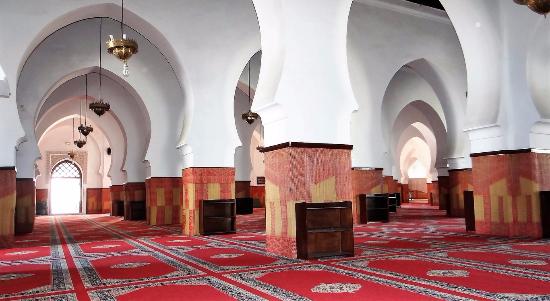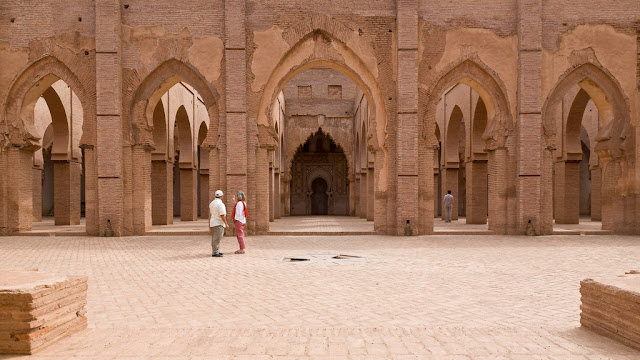Top 10 Beautiful Mosques in Morocco

We’re going to take a look at these ten beautiful mosques in Morocco we have listed below in more detail. Morocco, a beautiful North African country. There is so much to say about this place, but we must stick to the topic at hand.
Moroccans are a religious people, with nearly 97% of the country belonging to Islam. So it is only natural for the country to have some beautiful places of worship, and Morocco certainly has. Perhaps in another post we will address the beautifully Moroccan sand dunes.
But in this post we will take a look at the amazing colors, style, and architecture of Islamic Africa’s stunning mosques. During the French protectorate in Morocco, the mosque was used for nationalist meetings in the 1930’s.
Great Mosque of Sale
Sitting in Sale, Morocco is the Great Mosque of that city. Covering an area of 5,070 m2 (54,600 sq ft), it is a massive structure, the third-largest mosque in Morocco. It was initially built between 1028 and 1029 AD, under the orders of Temim Ibn Ziri.
However, being that we all know how crazy history has been in the past 1,000 years, it comes as no surprise that the mosque has been destroyed and also rebuilt multiple times since it was originally built. Especially in 1851 during the Bombardment of Sale, when the mosque suffered severe damage.
The style the mosque was built in is the Almoravid and Almohad styles, and it has nine appealing arches.
Zaouia Moulay Idriss II
The Zaouia Moulay Idriss II is actually what’s called a zaouia (a shrine), situated in Fes, Morocco. It id dedicated to and the resting place of Moulay Idriss II, the patron saint of the city of Fes. It is very much believed that visiting the shrine brings great benefits to people from all walks of life. From strangers who visit the city, to boys pre-circumcision, and also women wanting kids.
The origin of how the structure came to be is an interesting one. Almost five hundred years after the death of Moulay Idriss II, a well preserved body was found on the spot where the zaouia stands now. It was believed that the body belonged to Moulay Idriss II and thus the Zaouia was born.
Over the centuries since it’s founding and construction the building underwent many alterations and in the 18th century was almost completely revamped by Moulay Ismail, who chose a style called Alaouties which is typical of the majority of the style prevalent in Morocco today.
Tangier Grand Mosque
It dates back to the Moulay Ismali period, and in 1815 Moulay Sliman expanded it. On April 11, 1947, Mohammed V visited the mosque and gave a historic speech at the Mendoubia Gardens. The mosque has an exotic architecture and contrasting chalky white walls with green colored doors and coffered wood.
Great Mosque of Taza
Located near the “Gate of the Winds” (Bab er-Rih), the Great Mosque of Taza sits in the media of Taza in Morocco. It was built by the Almohad sultan Abd al-Mu’min sometime after 1142 CE. The walls are said to have been completed in 1172, and the mosque itself was made bigger during the reign of the Marinid dynasty between 1292 – 1293.
The mosque serves as one of the oldest standing examples of the Almohad architecture. In Morcoo it is commonly known for the in-scripted Large Chandelier inside which weighs about 3 tons.
Sidi Bou Abid Mosque
Just like Tangiers Grand Mosque, the Sidi Bou Abid is another mosque that overlooks the Grand Socco medina are of the central Tangier, Morocco; from the southwest though. The mosque was built back in 1917, and it’s still decorated with the polychrome tiles. Polychrome is the practice of decorating architectural elements in a variety of colors.
Which make the mosque’s tower beautifully noticeable and especially during the sunrise and sunset moments of the day. When the polychrome tiles really take on new shape.
Tinmel (Tin Mal)
Tinmel is a small village on top a mountain in the High Atlas region about 100k outside of the more popular Marrakesh. It served as the focal point of the Berber Almohad empire, from where they started their army campaigns against the Almoravids in the early 12th century.
When Marrakesh was seized in 1147, Tinmel became the spiritual capital and the artistic center of the Almohad Caliphate. In the village are also the tombs of the Almohad rulers. The mosque was built in 1156 to commemorate Mohamed Ibn Tumart, the founder of the Almohad dynasty. It is one of the only two mosques in morocco open to non-Muslims. Interestingly, the mosque was built based off of the Great mosque of Taza design.
Koutoubia Mosque
The largest mosque in Marrakesh, it is also known by these other names: Mosque of the Booksellers, Kutubiya Mosque, Jami’ al-Kutubiyah, Kutubiyyin Mosque, and Kotoubia Mosque. It was completed under the reign of Berber Almohad Caliph Yaqub al-Mansur between 1184 and 1199.
The mosque is beautifully decorated with curved windows and arches, pointed merlons, ceramic inlay, a large plaza with gardens, and it is lit up at night. It has a minaret which is 77 meters (253 ft) high, and includes a secondary tower, a dome, four orbs, a flag pole, and a spire; easily dwarfing the nearby palm trees. The mosque is made up of red stone, and has six rooms in succession, each one above the next.
Bab Berdieyinne Mosque
Sitting in the historical city center of Meknes is the Bab Berdieyinne Mosque. It was constructed in the 18th century, but in 2010 an event occurred that cause at least 41 deaths and many injuries. On February 19, 2010 the minaret collapsed during Friday prayers, mainly due to the are getting a lot of rain the previous days leading up to the tragic event.
King Mohammed VI immediately ordered that the minaret be rebuilt and to do so in accordance to historical specifications to preserve the history and culture of the structure. Also he ordered that all old mosques like this one be checked for structural stability.
Bou Inania Madrasa
A madrasa is the Arabic word for any type of educational institution. The Bou Inania Madrasa functioned both as an educational institution and a congregational mosque.
It is located in Fes, Morocco and was founded between 1351 and 1356 by Abu Inan Faris. According to history, religious leaders of the Karaouine Mosque advised Abu Inan Faris to erect this madrasa. It is globally acknowledged as the prime example of Marinid architecture. The Madrasa Bou Inania is the only madrasa in Fes with a minaret.
The madrasa eventually became one of the most important places of worship as well as religious institutions in Morocco, and ultimately gained the status of Grand Mosque. It is one of the few places in Morocco that accepts non-Islamic visitors.
Hassan II Mosque
Also known as Grande Mosquée Hassan II, this mosque is located in the renown Casablanca, Morocco. It is also the 13th largest mosque in the world, and the largest one in Morocco. It’s minaret however, is actually the worlds tallest, at a towering 210 meters (689 ft) high. The mosque was built in 7 years and completed in 1993 by Bouygues, and designed by Michel Pinseau. The walls of the mosque are hand-crafted marble, and the roof is retractable.
The mosque is situated by the oceans edge and actually looks out into the Atlantic Ocean. On top of the 60 stories high minaret is a laser, with it’s light being directed towards Mecca. Tourists who come to see it are astounded by it’s grandeur, it’s beauty, and by it’s significance to it’s worshipers; 25,000 of which can pray inside it at the same time, whilst another 80,000 can enjoy the outside.
Conclusion
Morocco truly is a beautiful country, with panoramic view ranging from the snow-covered peaks in the High Atlas mountain region to the never ending sand dunes of the Sahara, no person has ever gotten bored of this beautiful country.
Morocco truly is a beautiful country, with panoramic view ranging from the snow-covered peaks in the High Atlas mountain region to the never ending sand dunes of the Sahara, to the green north of the country, no person has ever gotten bored of this beautiful country.






























































No hay comentarios: